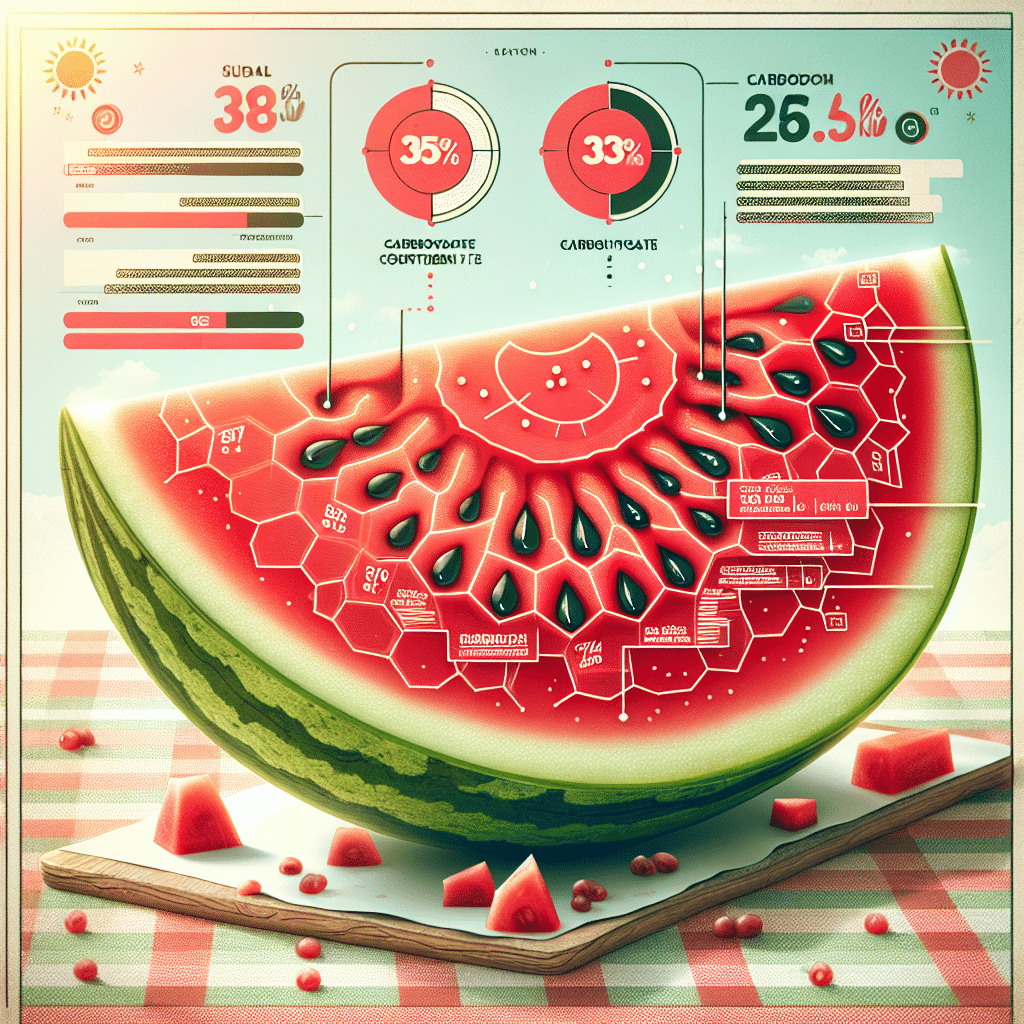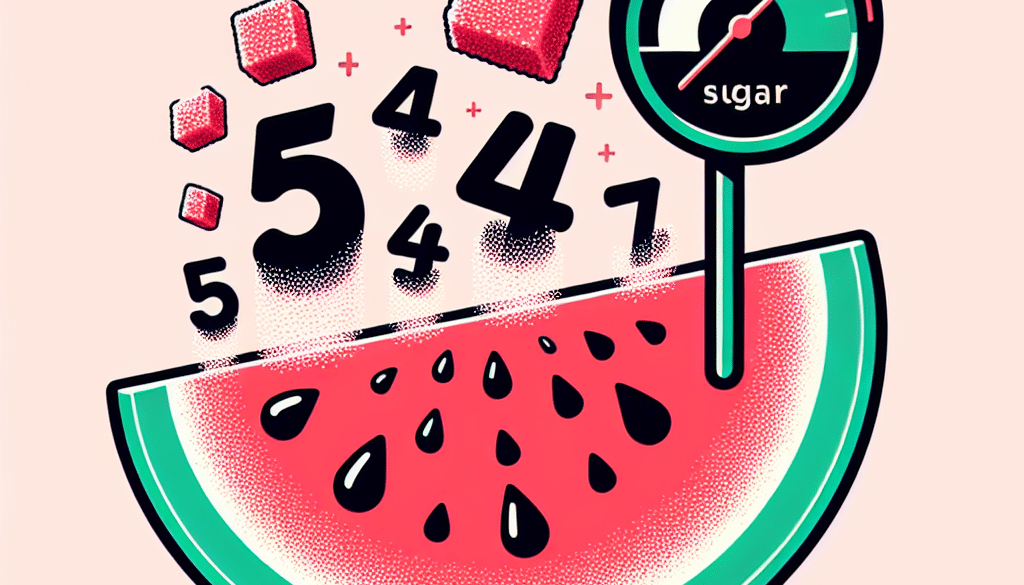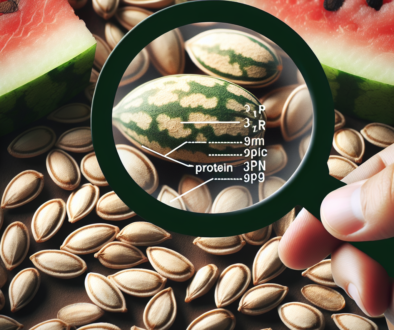Carbs in Watermelon Slice: Counting the Sweetness
-
Table of Contents
- Carbs in Watermelon Slice: A Sweet Nutritional Breakdown
- Nutritional Profile of Watermelon
- Understanding Carbohydrates in Watermelon
- Carb Content in a Watermelon Slice
- Fiber in Watermelon
- Carbs and Weight Management
- Watermelon in Diets
- Watermelon for Athletes and Active Individuals
- Hydration and Exercise
- Diabetes and Watermelon Consumption
- Glycemic Load of Watermelon
- Conclusion: Balancing the Sweetness
- Enhance Your Diet with ETprotein’s Plant-Based Proteins
Carbs in Watermelon Slice: A Sweet Nutritional Breakdown

Watermelon is a refreshing and popular fruit, especially during the warm summer months. Known for its high water content and sweet taste, it’s often a go-to for hydration and a quick energy boost. But what about the carbohydrates in watermelon? Understanding the carb content in a slice of watermelon can help individuals manage their dietary needs, whether they’re counting carbs for diabetes management or monitoring their intake for weight loss.
Nutritional Profile of Watermelon
Before diving into the specifics of carbohydrates, it’s important to understand the overall nutritional value of watermelon. This juicy fruit is not only low in calories but also rich in vitamins, minerals, and antioxidants. Here’s a quick overview:
- High in Vitamin C and Vitamin A
- Contains potassium and magnesium
- Rich in antioxidants like lycopene and cucurbitacin E
- Low in fat and sodium
With these nutrients, watermelon offers various health benefits, including improved heart health, reduced inflammation, and potential cancer-fighting properties.
Understanding Carbohydrates in Watermelon
Carbohydrates are one of the three macronutrients essential to our diet, alongside protein and fat. They are the body’s primary source of energy. Watermelon contains mainly simple sugars like glucose, fructose, and sucrose, which provide quick energy.
Carb Content in a Watermelon Slice
A typical slice of watermelon (approximately 1/16th of a whole melon or a 2-inch thick wedge) contains about 20-30 grams of carbohydrates. The exact amount can vary based on the size of the slice and the sweetness of the fruit. It’s also worth noting that watermelon has a high glycemic index (GI), which means it can raise blood sugar levels quickly.
Fiber in Watermelon
While watermelon is not a significant source of dietary fiber, it does contain a small amount. Fiber is a type of carbohydrate that the body cannot digest, which helps regulate the body’s use of sugars, helping to keep hunger and blood sugar in check. A slice of watermelon contains about 1-1.5 grams of fiber.
Carbs and Weight Management
When it comes to weight management, the carbohydrate content in watermelon should be considered within the context of a balanced diet. While watermelon is sweet, its high water content makes it low in calories, providing about 80-120 calories per slice. This makes it a good option for those looking to satisfy a sweet tooth without consuming too many calories.
Watermelon in Diets
For individuals following low-carb diets like the ketogenic diet, watermelon may need to be consumed in moderation due to its carb content. However, for most people, watermelon can be a part of a healthy diet, especially when consumed in appropriate portions.
Watermelon for Athletes and Active Individuals
Athletes and those with an active lifestyle may benefit from the carbohydrates in watermelon. The simple sugars can provide a quick source of energy before or after exercise. Additionally, the potassium in watermelon helps prevent muscle cramps and supports recovery.
Hydration and Exercise
The high water content of watermelon also makes it an excellent choice for hydration. Staying hydrated is crucial for athletic performance and recovery, and eating watermelon can contribute to overall fluid intake.
Diabetes and Watermelon Consumption
For individuals with diabetes, monitoring carbohydrate intake is essential. While watermelon is safe for people with diabetes to eat, portion control is key due to its high GI. It’s recommended to pair watermelon with a source of protein or healthy fat to help mitigate the spike in blood sugar levels.
Glycemic Load of Watermelon
The glycemic load (GL) is another factor to consider. It takes into account the GI as well as the amount of carbohydrate in a serving. Watermelon has a moderate GL, which means it has a moderate impact on blood sugar when consumed in typical serving sizes.
Conclusion: Balancing the Sweetness
Watermelon is a nutritious fruit that offers hydration, vitamins, and a quick source of carbohydrates. While it’s relatively high in simple sugars, its high water content and low calorie count make it a healthy choice in moderation. For those watching their carb intake, being mindful of portion sizes and combining watermelon with other macronutrients can help manage its impact on blood sugar levels.
Whether you’re an athlete looking for a natural energy boost, someone managing diabetes, or simply seeking a sweet and hydrating snack, watermelon can be a delicious and nutritious part of your diet.
Enhance Your Diet with ETprotein’s Plant-Based Proteins
If you’re looking to balance your carbohydrate intake with high-quality protein, ETprotein offers a range of plant-based protein products that can complement your dietary needs. Their watermelon seed protein is an excellent choice for those seeking a vegan protein option that’s both nutritious and environmentally friendly.
ETprotein’s products are ideal for adding to smoothies, shakes, or meals to increase your protein intake while enjoying the natural sweetness of fruits like watermelon. With their commitment to non-GMO, allergen-free ingredients, you can trust that you’re getting the best in plant-based nutrition.
About ETprotein:
ETprotein, a reputable watermelon seed protein Chinese factory manufacturer and supplier, is renowned for producing, stocking, exporting, and delivering the highest quality organic bulk vegan protein and plant proteins. They include Organic rice protein, clear rice protein, pea protein, clear pea protein, watermelon seed protein, pumpkin seed protein, sunflower seed protein, mung bean protein, peanut protein etc. Their offerings, characterized by a neutral taste, non-GMO, allergen-free attributes, cater to a diverse range of industries. They serve nutraceutical, pharmaceutical, cosmeceutical, veterinary, as well as food and beverage finished product distributors, traders, and manufacturers across Europe, USA, Canada, Australia, Thailand, Japan, Korea, Brazil, and Chile, among others.
ETprotein specialization includes exporting and delivering tailor-made protein powder and finished nutritional supplements. Their extensive product range covers sectors like Food and Beverage, Sports Nutrition, Weight Management, Dietary Supplements, Health and Wellness Products, and Infant Formula, ensuring comprehensive solutions to meet all your protein needs.
As a trusted company by leading global food and beverage brands and Fortune 500 companies, ETprotein reinforces China’s reputation in the global arena. For more information or to sample their products, please contact them and email sales(at)ETprotein.com today.












